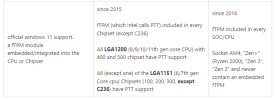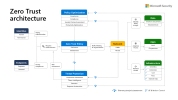I don't want this to turn into a big back and forth, so I'll leave with this:
I'd never heard that argument before so I looked up the EO itself and found nothing to support your assertion, and you haven't provided any corroborating analysis using that argument.
Microsoft has plainly and clearly stated their intention to implement these features due to the EO in their press release, which I posted previously:
https://www.microsoft.com/en-us/sec...trust-architecture-strategy-and-requirements/
Take it up with them. I didn't lie about it, I stated what they said and showed.
Which is why I said 7th gen PCs.
No,
you said "Many Intel 7th gen PCs actually do have TPM" - and
I said, "Actually,
almost no CPU's in the 7th gen have TPM" - which are diametrically opposing statements. Very few 7th gen processors have TPM - and I even listed the supported 7th gen processors in post #86 that will be supported that meet requirements - of which, Microsoft will be supporting(!).
Don't confuse a very select few PTT (Platform Trust Technology) motherboards that allow for a "plug-in" TPM - of which virtually no one supplied or purchased a separate TPM security processor, so there exists not very many in the wild. There are issue with the BIOS's that will never be updated for these now unsupported boards - and still the problem with DCH drivers which breaks the "Zero Trust".
Don't take it from me, here's the chart from Intel:

Many pre-built home-user PC's from Dell, Lenovo, HP and the like, didn't come with support for PTT or even a header for a PTT - even if the chipset supported PTT. Sure, higher end and Business-class systems may have come with the ability for a PTT - but those were still optional, and the PTT was an option that was generally not desired or needed (or even known about), so was not purchased.
We know that Windows 11, the hardened OS, runs perfectly fine on pre-8th-gen PCs.
Really? Can you provide support for your assertion? You haven't provided any corroborating analysis using that argument.
According to Microsoft they say (and which I also posted and linked in post #86):
- Reliability: Devices that do not meet the minimum system requirements had 52% more kernel mode crashes. Devices that do meet the minimum system requirements had a 99.8% crash free experience.
So, are you saying that Microsoft is lying about that and you have evidence to the contrary that applies on a mass scale, and not simply on an anecdotal, "some youtube guy got his working", basis?
I know some hardware runs it just fine, but I also know a lot of it doesn't and is quite unstable or fully non-working.
Also, in post #78 and #81 I alluded to the fact that Microsoft will be re-compiling their binaries and re-doing Credential Guard to work only with TPM/UEFI/VBS, but that has not happened yet. It stands to reason that the testing they mention at "
Update on Windows 11 minimum system requirements and the PC Health Check app" is the very testing for TPM/UEFI/VBS-only versions of the OS. So, while people are declaring "Windows 11 works just fine" - well, ya, while not using the TPM/UEFI/VBS-only version of Windows 11, it does.
The EO means US federal agencies should also have hardware that enables the hardened OS. The EO doesn't say all citizens need to have TPM or other security features.
Yes, you are correct - but I never stated nor claimed that the EO did say that all citizens need to have a TPM - but none-the-less, this is
WHY it is happening now as opposed to 10 years ago, or 10 years from now. You don't truly believe Microsoft woke up from a decades-long slumber less than 2 months after the EO was announced and released a press release
stating their intentions directly regarding the EO for their OS and infrastructure, do you? Was it simply by chance that these things directly coincided and Microsoft accidentally stated the EO and their intention in MS's own press release?
Government commands the lions share of contracts and business in this country and around the world, directly or indirectly, especially in our now fully digital world. To act as if that has no effect on "the industry" as a whole is to willfully disregard reality. This isn't the first time government has driven change in the IT industry, in fact, it's usually government that does drive major changes. This is historically, normal. (eg. The Internet).
Microsoft's requirements are likely to be far more to do with them wanting to reduce their support life cycle, to save many millions of dollars.
Can you provide support for your assertion? You haven't provided any corroborating analysis using that argument, and it's illogical.
Here's why that doesn't make sense:
"Wanting to reduce their support life-cycle, to save many millions of dollars"
Huh? Where are they doing that? Their support life-cycle hasn't changed. Windows 10 EOL was known in 2015 before it was even released to the public. They provided and are providing support exactly as was declared. As previously stated in post #90, the average "practical" life-span a PC has been roughly 10 years for the last 40+ years.
Microsoft doesn't support hardware - hardware vendors support their hardware. So I fail to see how they gain millions from someone else's products being sold, or lose money from other companies supporting their products of which were never Microsoft's.
it's just naive to think it's not primarily about money.
What money!?!? Microsoft makes and sells so little hardware it barely makes a blip for them! Are they making a ton of money from all those free upgrades from 10 to 11?
The people making the money from this are computer manufacturers, Dell, HP, AMD, Intel, MSI, Gigabyte, Asus, etc. - as people upgrade their hardware, not Microsoft. So are you saying this is a conspiracy between hardware manufacturers and Microsoft? You'll need to, again, provide something to justify that.
In fiscal year 2023, Windows 11 netted $22B from their overall $211B in revenue. That's not even
profit,
that's revenue! Microsoft is making all of their money in Azure and M365 - of which Windows 11 isn't a requirement. So I fail to see how this statement makes sense.
Sincerely,








